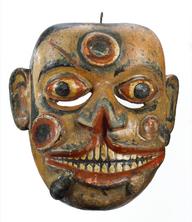





Acupuncture needle, steel and brass, 1700-1900
The coiled handle of this acupuncture needle, seen second from left, aids insertion. It is used in a technique called ‘scratching’. A fingernail is run up and down the coiled brass handle during this treatment. This sends vibrations into the acupuncture point. The coiled handle is a unique feature of Chinese needles. In Traditional Chinese Medicine (TCM), acupuncture needles are inserted into certain points on the skin. This unblocks the flow through the body of a life force known as qi (chi). TCM practitioners believe qi is essential to wellbeing.
Details
- Category:
- Asian Medicine
- Collection:
- Sir Henry Wellcome's Museum Collection
- Object Number:
- A643656
- Materials:
- steel (metal), brass (copper, zinc alloy) and complete
- Measurements:
-
overall: 110 mm .01kg
- type:
- acupuncture needle




